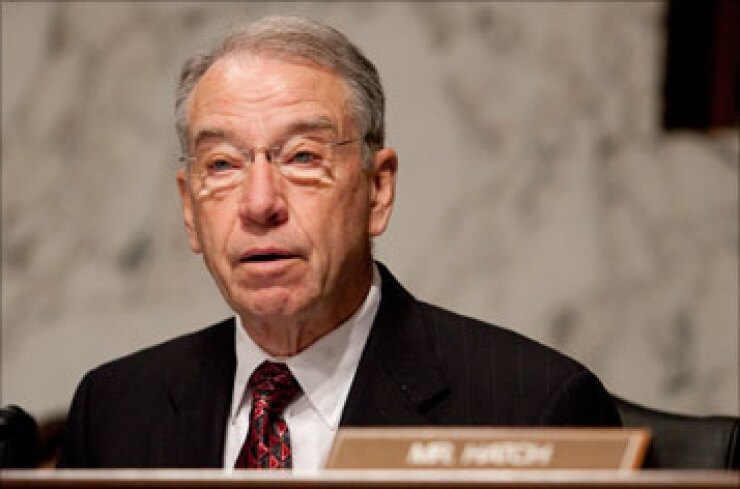WASHINGTON – Sen. Chuck Grassley, R-Iowa, and 14 other senators are urging Treasury Department and Internal Revenue Service officials to clarify tax requirements governing the use of tax-exempt bonds to refinance student loans, saying this will help reduce the nearly $1.44 trillion of student loan debt that is outstanding.
In a three-page bipartisan letter sent to Treasury Secretary Steven Mnuchin and IRS Commissioner John Koskinen, the senators said a notice issued by the tax regulators in November 2015 was very helpful regarding the use of qualified student loan bonds (QSLBs) to refinance student loans. However, they said further clarifications are still needed on issues that either were not covered by the notice or were confused by a subsequent private-letter ruling.
The number of student loan borrowers grew 89% between 2004 and 2014 and the aggregate debt tripled during that time to more than $1.3 trillion, according to the Federal Reserve Bank of New York. On Friday, the Federal Reserve Bank updated that number to almost $1.44 trillion in its quarterly release on consumer credit.

“One way to reduce that student debt is to make it easier for borrowers to refinance their student loans at a lower rate,” the senators told the Treasury and IRS officials.
“By making it unequivocally clear that QSLBs are eligible to be used for refinancing purposes [this] will “enlarge … the pool of borrowers who may take advantage of lower rates,” they wrote. QSLBs are tax-exempt private activity bonds.
In their Notice 2015-78, Treasury and the IRS had said that QSLBs could be used for a broad range of financings. But further clarification is needed because of a private-letter ruling issued in November 2014, according to the senators.
The letter-ruling (PLR-133996-13) suggested that the refinancing of a loan originally financed with tax-exempt bonds may be a refunding, the lawmakers said. “If this were the case, it would greatly hamstring any refinancing program to use tax-exempt bonds to refinance original loans under federal or state administered student loan programs,” they said in the letter. “Notice 2015-78 is silent on this issue and additional guidance is necessary to settle this issue once and for all.”
The senators asked the tax regulators to clarify that a loan originally refinanced with tax-exempt bonds can be refinanced with tax-exempt bonds without that being considered a refunding. The proceeds of the refinancing would not be used to pay off the old bonds, but rather to finance a new loan at lower rate that pays off the old loan. The issuer would obtain new volume cap for the new bonds, they said.
The senators also are asking for safe harbors or guidance that would ensure a refinancing bond’s tax-exempt status would not be questioned if there was reasonable due diligence done to determine that the original loan met size limitations. Under the tax law, a student loan must not be an amount larger than cost of attending the school minus any other financial assistance obtained. “Requiring an issuer in the case of a refinancing loan to retroactively self-verify that an original loan was in compliance with the loan size limitation would be a highly burdensome and time consuming process that could hamper any refinancing program,” the senators said.
The letter also asks the tax regulators to clarify that a former student can refinance an original loan that was a parent loan and vice versa. Notice 2015-78 said a student loan, whether taken out by a student or parent, is eligible for refinancing without regard to any cosigner or guarantor, but it doesn’t address whether a student can refinance a parent’s loan or a parent can refinance a student’s loan, the lawmakers said.
The senators ask that the tax regulators to allow parents to refinance student loans in the state where they reside regardless of where the student lives or went to school. The notice says tax-exempt bonds may be issued by a state to refinance a student loan based on the student’s current or former state of residence or school attendance. While this is helpful, the senators said, “It would appear that parents who currently live in a state that is different from their student’s current or in-school state or residence or attendance would be precluded from using refinancing loans from their current state or residence. A parent’s mobility should no more be penalized than his or her student’s.”
Tom Vander Molen, a partner at Dorsey & Whitney in Minneapolis said, “I think you’d need a change in the statute for this because the statute doesn’t say anything about where the parent lives.”
“We are appreciative and grateful for Notice 2015-78,” the senators concluded in their letter. “We respectfully ask Treasury and the IRS to make clear the points [we raised] so that our state-approved programs can get to work providing more options and clarity to their borrowers.”





